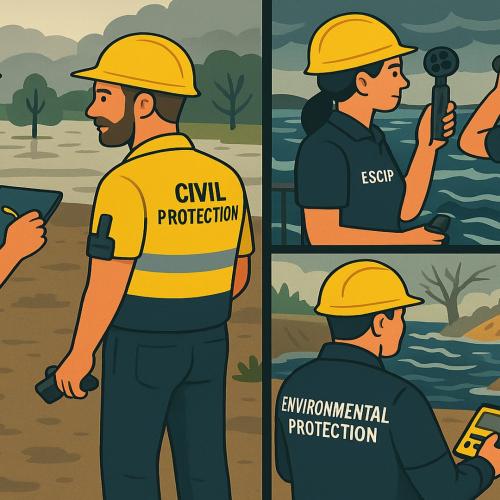IMPEL Network
The European Union Network for the Implementation and Enforcement of Environmental Law (IMPEL) is an international non-profit association of environmental authorities from EU Member States and neighbouring countries. Based in Brussels, it currently brings together 59 members from 38 countries. Its projects focus on awareness raising, capacity building, peer review, exchange of experience and promoting the enforceability of EU environmental legislation.
ESCIProject
Within its Rolling Work Programme 2025–2027, IMPEL has launched a new initiative Environmental technical-scientific Support to Civil Protection Bodies for inland Natural Disasters prevention, preparedness, response, and recovery (ESCIP Project). ESCIP (also called ESCIProject) aims to strengthen collaboration between environmental and civil protection authorities in managing inland natural disasters, covering prevention, preparedness, response, recovery, and environmental restoration. The project also seeks to provide useful lessons learned, best practices, and recommendations to enhance procedural, technical, and operational capacities.
Questionnaire
In the current first project year (2025), the ESCIP project has developed a Questionnaire-based Survey to assess the strengths, weaknesses, opportunities, and threats (SWOT) of organisations that support civil protection in the prevention, preparedness, response, and recovery phases of environmental emergencies. The focus is on inland natural disasters such as hurricanes, earthquakes, tsunamis, floods, wildfires, landslides and droughts.
Target Audience
The target audience of the ESCIP questionnaire includes:
- Environmental authorities, regulators, and public institutions
- Civil protection authorities and stakeholders
- Environmental emergency planners, responders and disaster managers
- Policy makers and decision-makers in emergency preparedness, response, and recovery
- International emergency response organisations
- NGOs and academic institutions involved in disaster and environmental management
Survey Goals
The survey has four main goals:
- Gathering insights on SWOT (strengths, weaknesses, opportunities, threats) related to environmental emergency management across all phases of inland natural disaster scenarios.
- Identifying technical and operational reference materials (guidelines, protocols, tools), with a focus on inland environmental emergencies related to natural disasters, industrial incidents or other major crises.
- Collecting best practices, case studies, and lessons learned.
- Identifying challenges and training needs.
Outcomes
Your responses will contribute to the ESCIP Survey Report on environmental emergency systems within environmental organisations and will help foster cooperation, knowledge sharing, and the development of training activities within the ESCIP project. The project team thanks participants in advance for their collaboration and support.
